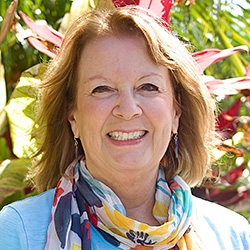

Search Results: nvc
-
Deepen your empathic presence with Raj and Mary, for those with basic understanding of NVC.
-
Explore gratitude with Jori & Jim Manske to stay present and flourish in everyday life.
-
Reimagine how you handle conflict—Miki helps fine-tune your skills for empowered negotiation.
-
Honor the wisdom in your BIG emotions as you are guided through anger, fear, and shame with NVC.
-
Create a clear empowered relationship with money and align your finances with your ideal life.
-
Mary Mackenzie, renowned CNVC Certified Trainer, shares her understanding and experience of empathy.
-
See how consciousness evolves and links to NVC using Wilber’s stage development ideas.
-
Discover seven key conversations that help intimate relationships thrive.
-
Learn to ask for feedback by focusing on relationship quality before the request itself.
-
CNVC Certified Trainer Stephanie Bachmann Mattei leads you through an 8 minute meditation designed to develop a more integrated body and feelings/needs awareness.
-
-
Hello,
I’m Iris Bawidamann. When Mary reached out to me asking if I’d write this letter, I sat for some time meditating on what is alive for me and what I want to share with you… This is what surfaced for me… Fear sits with me—on my shoulders, in my chest. A familiar presence I consciously keep in check so it doesn’t take over. Watching global politics, conflicts, and rising polarization, I often feel overwhelmed. The world is shifting.
-
-
Discover why empathy is a vital workplace skill, boosting productivity and collaboration.
-
- Unpack interpersonal, internalized, and institutional racism from the lens of NVC consciousness
- Hear and share personal stories and the impacts of racism, power, and privilege
- Learn how to translate “hard to hear" messages into meaningful conversations
- Expand and deepen the conversation of systemic and interpersonal racism
-
First, on the personal side… I’ve already planted half of my vegetable garden and it was so completely enjoyable. Remember how challenging this was for me a couple of years ago? My inner jackal did have a few things to say this year, but not nearly as many as in past years. And, I gave her loads of empathy so we made it through. I am thrilled about this. I can’t wait to see my seedlings pop up! If it’s a successful garden, I’ll share pictures in a future letter.
-
We’re in the throws of a particularly worrisome presidential election in the USA. Combined with world affairs and the global warming of our earth, we are seeing a level of despair higher than I ever remember experiencing.
As a result, the level of blaming others, judgments, dis-ease, and lack of trust that I experience or hear about every day is at an all-time high. I think there’s so much fear that we’ve begun lashing out at others, and rage is either visible or ever lurking.
-
Dear friends,
#UnlockYourAuthenticVoice
This has been on my mind lately. What does it mean to unlock my authentic voice? How do I talk about things that matter to me without creating emotional distance between myself and others? I’ve found this especially challenging after the US presidential election this month— half the voters are devastated by Donald Trump’s election, and the other half are elated. The extremes are vast. Sometimes imagining a coming-together feels hopeless.
-
Dear friends,
Happy April Fool’s Day, which, according to Wikipedia, “is an annual custom on April 1st consisting of practical jokes and hoaxes.” I always think of my Mom on April Fool’s Day. She was mostly a stern person who scorned practical jokes, but on April Fool’s Day, she would play hoaxes on my father. One year, she...
-
Quick Links

Stay in Touch!
We value your privacy, won't share your email address and you can easily unsubscribe any time.














